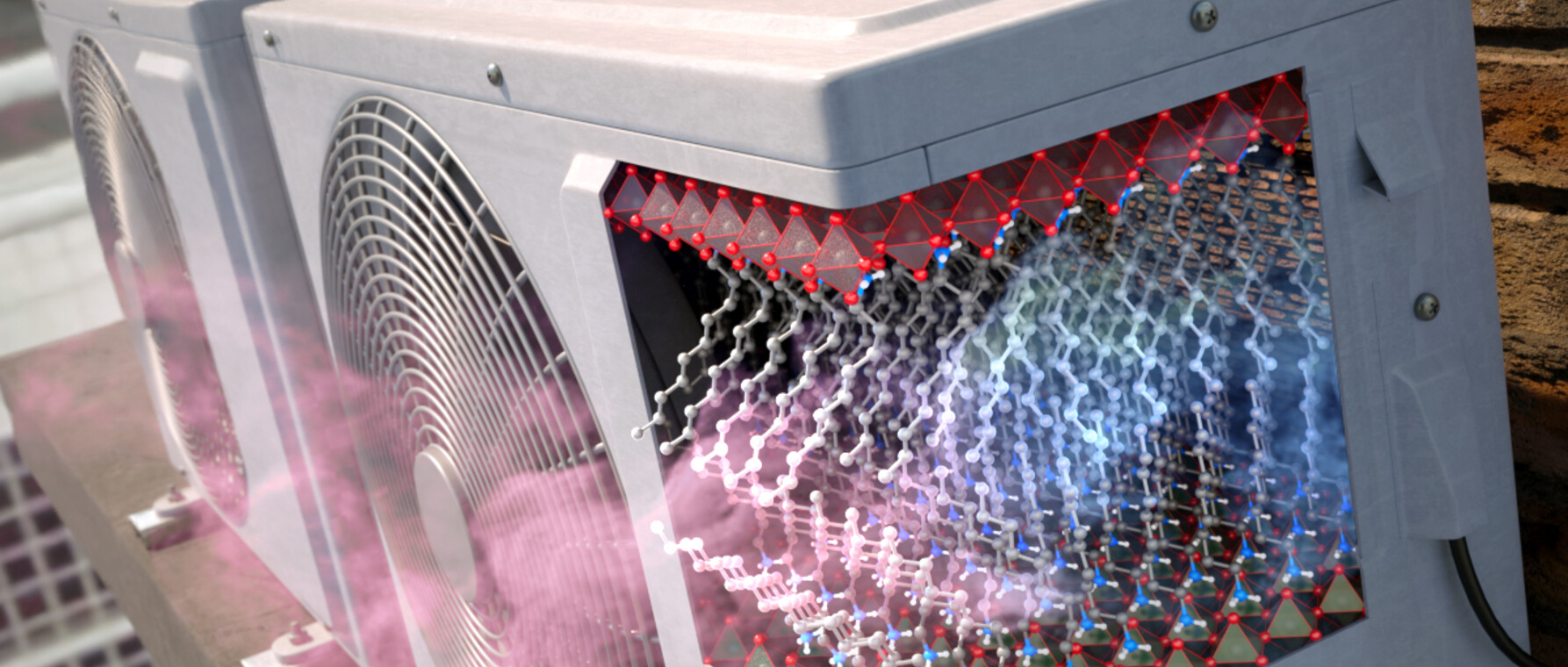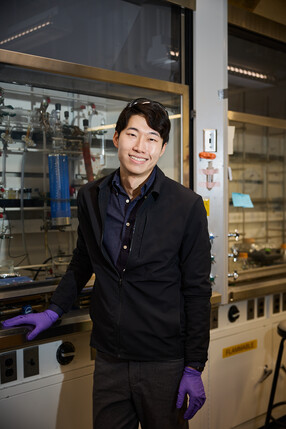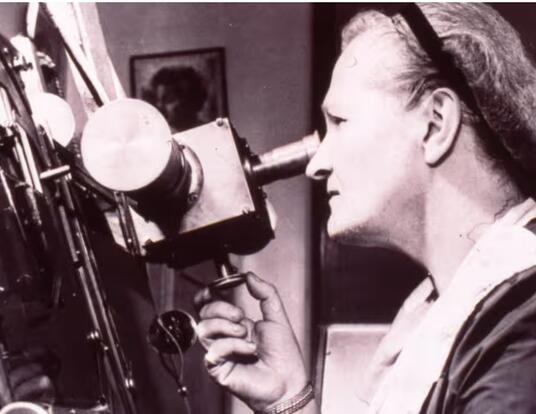Greener Cooling for a Warmer World
Jinyoung Seo reinvents the air conditioner

Research at Risk: Since World War II, universities have worked with the federal government to create an innovation ecosystem that has yielded life-changing progress. Now much of that work may be halted as funding is withdrawn. Find out more about the threats to medical, engineering, and scientific research, as well as how Harvard is fighting to preserve this work—and the University's core values.
Earth is getting hotter. Much hotter. A 2022 Washington Post analysis of data from the nonprofit First Street Foundation projected that 63 percent of the US population will experience an average of at least three consecutive days of 100-degree heat every year—up from 46 percent today. In parts of the South and Southwest, residents could see as many as 70 consecutive days of temperatures over 100. And yet, the Post reports, the populations of Arizona, Texas, and Florida, which will be hardest hit by the warming trends, continue to expand faster than those of other states.
All of those people will need air conditioning and refrigeration to make life bearable. But Jinyoung Seo, a graduating PhD student in chemistry and chemical biology at the Harvard Kenneth C. Griffin Graduate School of Arts and Sciences, points out that the technologies that keep us cool are also the ones that make our planet warmer.
“Our current cooling systems rely on hydrofluorocarbon refrigerants,” says Seo. “Most of those are potent greenhouse gases. As the world gets hotter, we need new technologies that can keep us cool sustainably.”
Seo, a 2023 Harvard Horizons Scholar, has taken up this challenge. His project, “Reinventing Air Conditioning with Chemistry,” uses solid refrigerants to eliminate direct greenhouse gas emissions while making cooling systems smaller and vastly more efficient. Through this “solid-state cooling,” Seo says he hopes to reinvent air conditioning—and contribute to the fight against climate change.
Freedom from Freon
A traditional air conditioning (AC) unit operates by compressing and expanding a refrigerant—usually a variant of the hydrofluorocarbons (HFCs), including freon. The refrigerant begins as a liquid and then changes to a gas as it absorbs heat from indoors and is sent to the unit’s compressor. “Many hydrofluorocarbons undergo a phase transition from a gas to a liquid when they are compressed at moderate pressures—10 to 20 times that of the atmosphere,” explains Jarad Mason, assistant professor of chemistry and chemical biology and Seo’s doctoral advisor. “This leads to a large increase in temperature.” That heat is vented to the outdoors, which cools the refrigerant and shifts the phase back to a liquid. The cycle continues until the space reaches the desired temperature.
Although AC units have become more efficient over the decades, the basic mechanism for cooling has remained more or less the same ever since it was invented around 200 years ago. The problem, in an age of climate change, is that the HFC refrigerant is a major greenhouse gas. “It’s thousands of times more potent than carbon dioxide,” Seo says. “And, as you can imagine, the gas leaks out into the air as we use it. The HVAC industry has tried to adapt and use more sustainable agents in their units, but they still rely on greenhouse gases.”
In contrast to most solids, these [new] materials get very cold when they are compressed and very hot when they are expanded, which makes them extremely effective refrigerants.
–Professor Jarad Mason

Seo seeks to replace HFCs with a solid refrigerant. Unfortunately, solids are far less sensitive to pressure than liquids, making them poor coolants. “When solids are compressed to the same degree as fluorocarbons, they typically undergo very small temperature increases,” Mason says. “Most require pressures thousands of times that of the atmosphere to experience a high enough temperature increase to drive a practical cooling cycle.”
Seo, however, has discovered a new class of solids that are extremely soft and behave much like liquids. “The material is a kind of mineral, but it contains both organic and inorganic components,” he says. “Its molecular structure reminds you of a cell membrane—long, fluffy, organic chains confined between layers. And the thing about cell membranes is that they’re dynamic. They move around. Depending on the temperature, they can go from a frozen, ordered chain to a disordered, dynamic chain. The same is true for these materials, and we leverage that phase transition for cooling. We still need a liquid like water to move the heat around, but the hard work is done by the solids.”
Mason says that Seo’s work represents a fundamentally new mechanism for driving cooling cycles with solid refrigerants. “Jinyoung has discovered how to make certain types of solid materials undergo very large temperature changes when they are compressed at the same pressures already used in commercial cooling systems,” he says. “In contrast to most solids, these materials get very cold when they are compressed and very hot when they are expanded, which makes them extremely effective refrigerants.”
Beyond Sustainability
While reduced greenhouse gas emissions may be the greatest benefits of Seo’s reinvented air conditioner, he points out that there are others as well.
Because solid refrigerants hold more energy in less space, air conditioning units that use them could be more compact. “Think of how dispersed the molecules of a substance are in a gaseous state,” he says. “The amount of energy per volume is pretty small. Solids are much denser, so the density of thermal energy you can store in that state could be much larger,” Seo says.
Moreover, by using a solid instead of a volatile gas like HFCs, air conditioning can actually be more efficient. “Since we’re using a material in the solid state, the volume we need to compress to induce a phase transition can be small,” he says. Greater efficiency could make the units more affordable than traditional air conditioners over their lifetimes.
Air conditioners that use solid refrigerants could also be quieter than traditional units. Because solids are contained and easier to manage, it might also be possible to recycle them. And there could also be unimagined uses for the new technology. “These super-compact ACs might generate new applications for cooling we haven’t thought of before. We don't know what these will be yet, but it is exciting to think of the future.”
With support from the Gordon and Betty Moore Foundation as well as an internal climate change grant from the University, Seo is working with a postdoctoral fellow and other students to develop a prototype air conditioner. He says Professor Mason’s group is already fielding calls from HVAC companies. “There’s a lot of collaboration going on in our lab right now,” Seo says.
These super-compact ACs might generate new applications for cooling we haven’t thought of before. We don't know what these will be yet, but it is exciting to think of the future.
–Jinyoung Seo
Seo can’t say for sure when his team’s reduced emissions air conditioner could hit the market, but they’ve been encouraged by venture capitalists to form a company and commercialize their work. In the meantime, he says he and his colleagues are working to refine their prototype and understand solid refrigerants at a fundamental level. “By looking more deeply into the science of these materials, we can address some of the challenges of engineering a full-size next generation cooling unit.”
Developing a cleaner, smaller, more efficient air conditioner would be a major innovation. But Seo says that commercial invention is not actually what drives his work. He has a passion for basic research in molecular chemistry and wants to show that it can have unexpected benefits—including solutions that could help save the planet.
“I started my PhD thinking about ways to understand thermal energy in materials at the molecular level and somehow drifted to air conditioning,” Seo says. “So, as I graduate, my hope is actually to point out how molecular thinking can help us reconsider old technologies like air conditioning and tackle grand challenges like climate change. That’s what’s really exciting to me.”
This research was funded by the National Science Foundation, the National Nanotechnology Coordinated Infrastructure Network, and the U.S. Department of Energy.
Portrait by David Salafia
Get the Latest Updates
Join Our Newsletter
Subscribe to Colloquy Podcast
Simplecast





